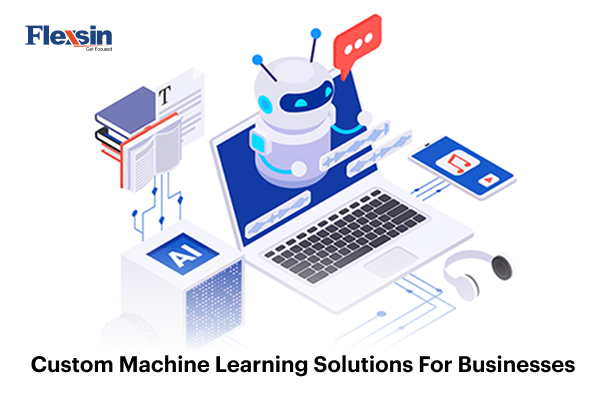Search engine algorithms evolve faster than most marketing teams can adapt. With content saturation and shifting search intent, traditional SEO tactics no longer guarantee visibility or conversions. The solution? A Machine Learning (ML) strategy that’s not just intelligent—but tailored to your business.
Yet many B2B companies face a harsh reality: off-the-shelf ML models rarely fit real-world SEO needs. Algorithms designed for general use often miss context, fail to scale, or underperform on specific domain data. Flexsin Technologies fills this gap by delivering customized ML consulting services designed for your industry, your platform stack, and your marketing KPIs.
1. The Customization Challenge in Machine Learning (ML) SEO Strategies
The world of machine learning is vast—with branches like supervised learning, clustering, and neural networks powering everything from chatbot responses to predictive analytics. But when applied generically to SEO, even the most sophisticated ML algorithms can:
- Misclassify long-tail keywords due to lack of industry training
- Apply regression models to flawed or irrelevant datasets
- Fail to account for brand-specific tone in content classification
- Overfit models to narrow ranking patterns, leading to volatility
This often results in low ROI, misaligned optimization efforts, or even de-ranking when algorithms push the wrong type of content.
Flexsin’s Machine Learning (ML) Consulting Approach to Customization
Flexsin understands that customization is non-negotiable when applying ML to SEO. Their process includes:
Industry-Tuned Model Training
Flexsin starts with industry-specific data to train supervised or semi-supervised learning models. For example:
- A B2B SaaS firm focusing on CRM integrations benefits from a classification engine trained on SaaS-specific search language.
- An industrial equipment supplier uses a clustering model to segment content based on buyer intent (engineers vs procurement managers).
Customized NLP & Neural Networks Flexsin’s team deploys custom neural networks and NLP layers to detect not just keywords, but semantic relationships—key for Google’s BERT and RankBrain algorithms.
Example:
A leading e-commerce platform partnered with Flexsin to train an ML model that restructured 3,000+ product descriptions based on semantic similarity, increasing page dwell time by 26% and boosting category rankings in 2 months.
Regression Models for Predictive SEO By applying regression models to historical SEO performance, Flexsin can predict keyword saturation points, allowing marketers to pivot before rankings plateau.
2. Solving Integration Challenges in Machine Learning (ML) SEO Workflows
Even the most advanced Machine Learning (ML) strategy can fall apart at the integration stage. Why? Because most businesses operate within a patchwork of platforms—CMSs, CRMs, keyword research tools, and analytics dashboards—none of which are ML-ready out of the box.
When ML models can’t interact with these tools or exchange data with marketing platforms, SEO automation becomes fragmented. The result? Manual interventions, inconsistent insights, and stalled campaigns.
This is where Flexsin’s ML consulting services deliver significant impact—building integrated, real-time machine learning pipelines that are deeply embedded in your SEO ecosystem.
3. Common ML Integration Barriers in SEO Environments
For B2B marketing teams, these are some of the most pressing ML integration challenges:
- Siloed data repositories that break training continuity for ML models
- No native API connectors between ML models and SEO tools like Ahrefs or Moz
- CMS platforms that don’t support ML-driven content scoring or dynamic tagging
- Limited DevOps support to continuously deploy ML updates to live SEO systems
- These gaps make it difficult to implement unsupervised learning, reinforcement learning, or even basic classification systems for content, keyword clusters, or backlink profiles.
4. Flexsin’s Integrated ML Framework for SEO Efficiency
Flexsin solves integration issues with a full-stack SEO consulting approach, connecting AI and ML systems with every layer of your SEO operation.
Unified Data Infrastructure
Flexsin establishes a centralized data pipeline by integrating SEO metrics, user behavior signals, CRM activity, and campaign data into a single ML training environment.
- Supports real-time ingestion from Google Search Console, GA4, HubSpot, SEMrush
- Enables reinforcement learning models to adapt based on live feedback
Custom API Connectors & Automation Scripts
Rather than force-fit ML models, Flexsin builds bespoke API connectors that automate:
- Meta tag recommendations
- Internal linking optimizations
- Anchor text variance scoring
- Automated A/B testing inputs for landing pages
ML-Enhanced CMS Automation
Using supervised learning classifiers, Flexsin integrates models directly into CMS workflows (e.g., WordPress, Drupal), enabling:
- Real-time content scoring before publishing
- ML-based suggestions for SEO titles, headers, and schema
- Personalized content delivery using audience behavior segmentation
Client Use Case:
A global legal advisory firm implemented Flexsin’s integrated ML pipeline.
Result:
- Real-time optimization of 500+ service pages
- 2x faster SEO testing cycles
- 43% increase in monthly qualified leads from organic traffic
5. From Pilot Projects to Scalable ML-Driven SEO Success
Machine learning isn’t just a test run—it’s a growth engine. Flexsin builds ML strategies that scale across teams, markets, and KPIs.
Launching a Machine Learning (ML) pilot for SEO is a great first step. But most companies get stuck in the “prototype trap”—a model works in isolation, but can’t be scaled across multiple campaigns, regions, or platforms. Without proper ML infrastructure, businesses fail to capture long-term ROI.
Scalability in ML isn’t about running more algorithms—it’s about creating systems that continuously learn, self-optimize, and evolve. Flexsin’s ML consulting services are designed exactly for this: to move businesses from experimental models to enterprise-wide SEO transformation.

6. Why Machine Learning (ML) Fails to Scale in SEO?
Several factors hinder ML scalability in SEO use cases:
- Static models that can’t retrain on evolving keyword trends or Google algorithm updates
- Lack of feedback loops to fine-tune predictions based on user behavior or content performance
- Rigid infrastructure that doesn’t support multi-tenant deployments or cross-platform ML pipelines
- No shared visibility between marketing, data science, and SEO stakeholders
Without solving these challenges, even a strong neural network or reinforcement learning model can hit performance ceilings quickly.
7. Flexsin’s Scalable ML Framework for Enterprise SEO
Flexsin builds resilient, cloud-native ML infrastructures that are modular, adaptive, and fully aligned with SEO business goals.
Cloud-Enabled ML Orchestration
When you hire SEO experts, they will work to deploy ML models on scalable cloud platforms (AWS, Azure, GCP), ensuring:
- Instant compute for deep learning workloads
- Multi-language SEO support using semi-supervised learning
- Elastic scaling for high-traffic events or campaign rollouts
Continuous Learning Systems
With integrated performance feedback loops, Flexsin’s ML frameworks adjust in real-time based on:
- CTR shifts
- Bounce rates
- Content engagement
- Keyword difficulty evolution
These loops inform ML algorithm retraining and improve the model with every interaction.
SEO Performance Dashboards with ML Insights
Flexsin Technologies integrates ML outputs into business-friendly dashboards showing:
- Predicted ranking volatility
- Real-time keyword clustering outcomes
- Regression-based content value forecasting


 Munesh Singh
Munesh Singh